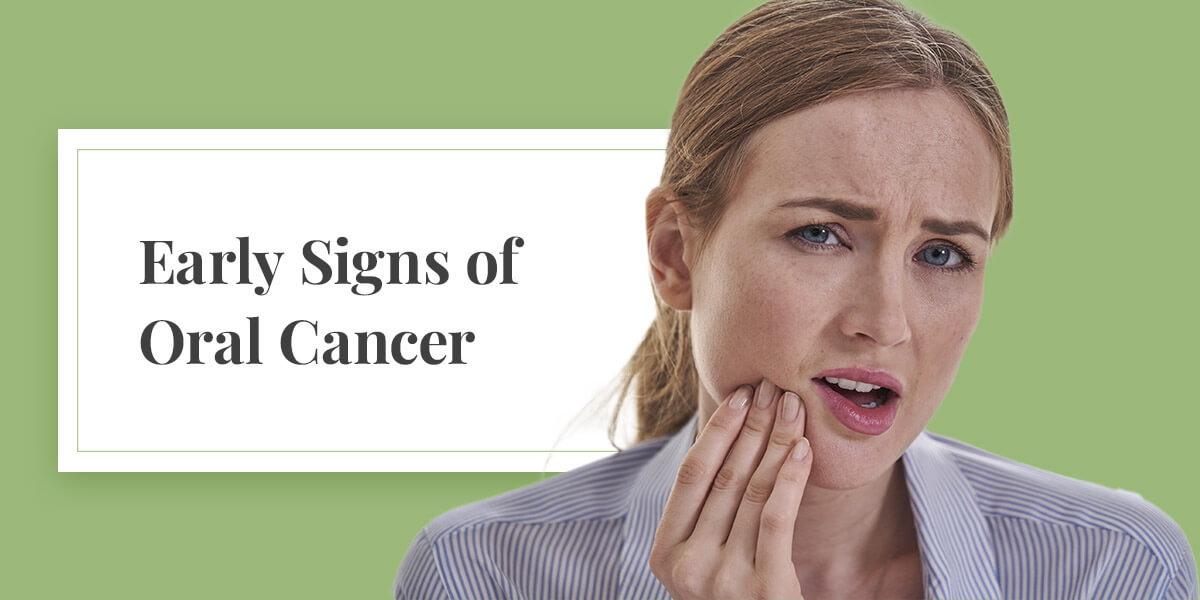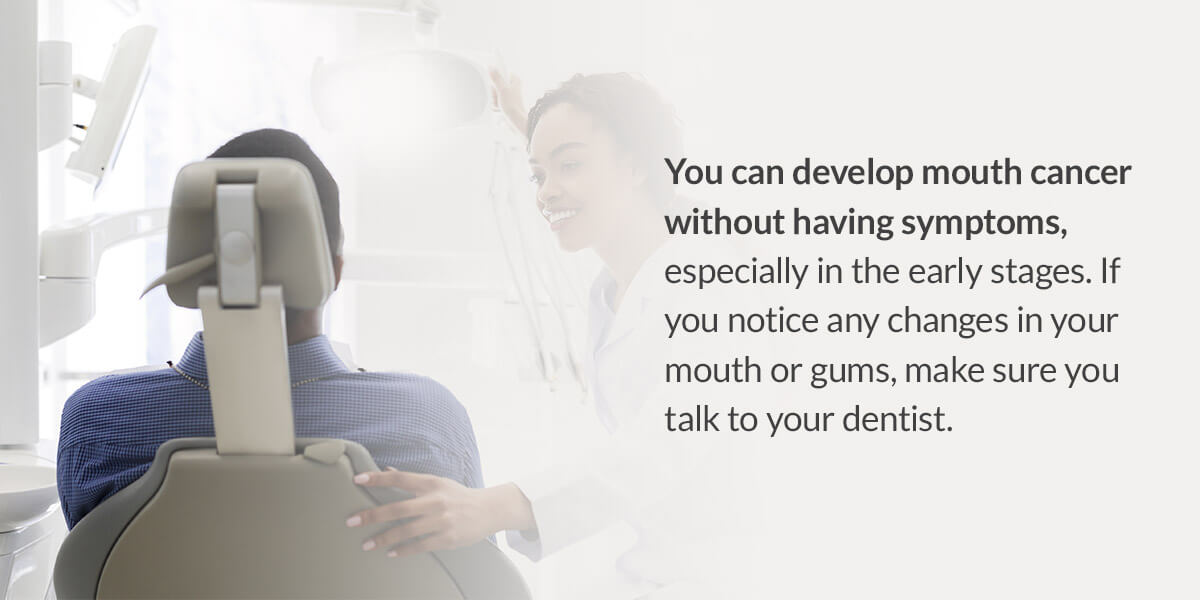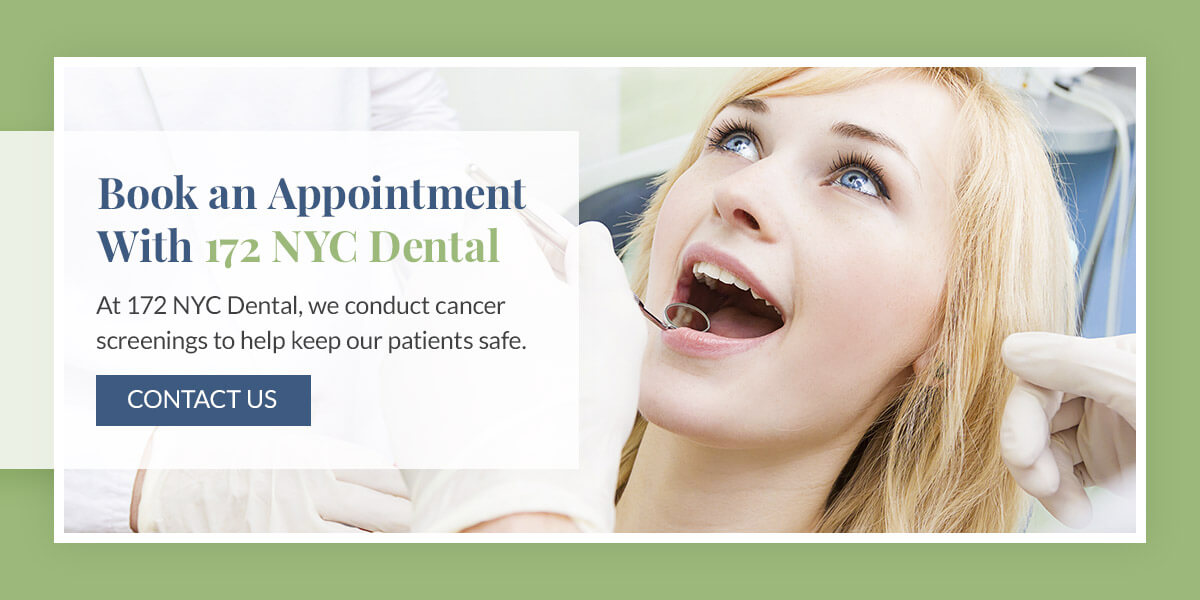
If you notice changes in your gums or mouth, you might be concerned that you could have oral cancer. Many other conditions could look like cancer, which is why it is important to see your dentist for a diagnosis and treatment.
Keep reading for more information about oral cancer and how you can potentially notice the warning signs.
What Is Oral Cancer?
Oral cancer is broadly defined as cancer of the back of the throat and inside of the mouth. Oral cancer can affect the inner lip area, tongue, or roof and floor of the mouth. Cancer of the oropharynx area, which includes the tonsils and parts of the throat, can be more difficult to notice.
Oral cancer might appear as a white patch or a bleeding sore on your lip or mouth, but visually identifying cancer can be difficult. Many issues can look similar to cancer of the mouth, but changes caused by cancer usually remain without regressing or healing. Oral cancer can spread to other parts of your head or neck if left untreated.
Who Is Affected by Oral Cancer?
Most typically, oral cancer affects seniors of age 60 or older, but it can occur in people of any age. Your risk for developing oral cancer is around 11 in 100,000, but certain factors could make you more vulnerable. Below are risk factors that make you more likely to develop oral cancer:
- Smoking or using tobacco products
- Having a Y chromosome
- Having a compromised immune system
- Having a personal medical history of cancer
- Having a family history of cancer
What Causes Oral Cancer?
Like other cancers, the causes of oral cancer are still being researched. Some genetic or hereditary factors might make you more vulnerable to developing this type of cancer. Lifestyle choices can also play a role. People who use tobacco products or who have been exposed to frequent secondhand smoke are at an increased risk of developing cancer, and chewing tobacco products can significantly increase your risk of getting mouth cancer. This is believed to be because tobacco causes damage to cellular DNA, having a negative impact on the cell cycle.
Oral cancer commonly begins in your oral cavity’s squamous cells, which lie underneath the topmost layer of skin. These cells are flat and look similar to fish scales when viewed under a microscope. Squamous cells can become cancerous and begin a rapid growth cycle due to abnormal changes in DNA.
Cancerous cells can spread through the bloodstream to other parts of your body. Cells infected with cancer will lose control of their growth cycle and begin multiplying more quickly than normal. The uncontrolled overgrowth of excess cells is what causes symptoms and warning signs of mouth cancer.
How to Recognize Oral Cancer and Common Symptoms
You can help protect yourself from cancer by familiarizing yourself with the warning signs. The signs of oral cancer are sometimes difficult to notice, especially to the untrained eye. Early symptoms of oral cancer may involve a strange or uncomfortable stiffness under your skin where cancer initially starts, but changes in your tissues are usually too small to detect.

You can develop mouth cancer without having symptoms, especially in the early stages. If you notice any changes in your mouth or gums, make sure you talk to your dentist. This type of cancer is also prone to forming in different parts of the mouth, including both the hard and soft palate. All of these factors can mean your best chance of getting a fast diagnosis is to see a dentist for an exam.
Oral cancer can have different warning signs depending on the location where it initially develops. Your dentist may briefly screen for mouth cancer during your routine checkup. This includes a simple visual examination of the inside of your mouth and lips for possible signs of cancerous activity. You should regularly see your dentist for checkup appointments for cancer screenings and to ensure your teeth are healthy.
Below is a list of potential oral cancer symptoms that you should talk to a doctor about, especially if they last longer than two weeks. Symptoms may include:
- Coughing
- Numbness
- A swollen jaw or neck
- Irritation or soreness in your mouth or throat
- Unusually thick skin in your mouth or throat
- A white or red scaly patch inside your mouth
- Unexplained hoarseness
- Difficulty chewing
- An obstruction that causes difficulty swallowing or speaking
- Difficulty moving your tongue
- Ear pain without hearing loss
- Unexplained weight loss
What Conditions Can Look Like Oral Cancer?
One problem with trying to self-diagnose oral cancer is that many other conditions can cause dental or oral health problems. You might notice a change in your mouth that is less serious than cancer but still requires treatment. Some conditions might heal on their own without treatment but are still worth checking.
You should avoid trying to diagnose yourself, which can cause anxiety and dread when the problem might be something else. If you think you might have oral cancer or another condition with similar symptoms, speak with a dentist who can help.
Conditions that might share some symptoms with oral cancer include:
- An injury to your mouth or teeth
- Cold sores
- Herpes
- Periodontal disease
- An upper respiratory infection
- An allergic reaction
- An oral mucocele or cyst
- A bacterial infection of the tongue or mouth
Oral Cancer Prevention
Although cancer is unpreventable, early detection and treatment are possible for helping you live the healthiest life. The best prevention for oral cancer is to get an advanced screening so your doctor can catch any abnormalities and make an early diagnosis before the cancer progresses and becomes more difficult to treat.
You can limit your cancer risk factors by making healthy lifestyle choices. Limit your smoking or tobacco use, and try to quit using these products, especially if cancer runs in your family. Make sure you provide an accurate dental and medical history for your doctor’s review. If you are at risk, let your doctor know so you can receive the best possible care.
During an advanced screening, your dentist will use special lighting to examine the soft tissues inside your mouth, including your lymph nodes. A suspicious lesion can be biopsied and sent to a lab, or you can get a referral to a specialist who can remove the lesion.

Book an Appointment With 172 NYC Dental
At 172 NYC Dental, we conduct cancer screenings to help keep our patients safe. Interested in making an appointment? Learn about our diagnostic and preventative services, and contact us if you have questions.








